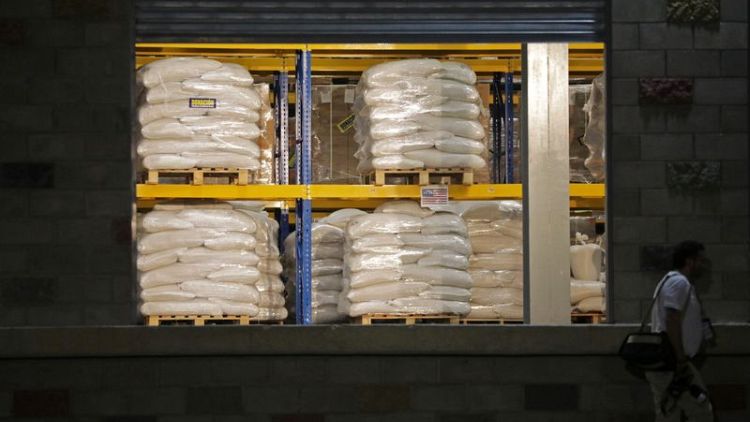CARACAS (Reuters) -A U.S.-backed effort to send aid to Venezuela in 2019 that ended in a violent standoff on the Colombian border was not planned in alignment with humanitarian principles, according to an audit by the Washington-based aid agency involved in the operation.
The U.S. Agency for International Development (USAID) sent aid material to the Colombian border region in February 2019 amid chronic shortages of food and medicine and rising malnutrition in Venezuela.
The Trump administration had planned for the supplies to be carried across the Colombian border into Venezuela by allies of Venezuelan opposition leader Juan Guaido. But the aid convoys were blocked by troops loyal to President Nicolas Maduro - who called the operation a violation of the nation's sovereignty.
"(The) directive to pre-position humanitarian commodities was not driven by technical expertise or fully aligned with the Office of Inspector General, U.S. Agency for International Development ... principles of neutrality, independence, and being based on needs assessments," the USAID audit concluded.
The report, originally released on April 16, was first reported by the Associated Press.
The border standoff took place weeks after the Trump administration recognized Guaido as Venezuela's legitimate president and backed Guaido's creation of an interim government that was meant to advance a political transition in Venezuela.
During the aid effort, USAID leaders instructed officials to align decisions "toward reinforcing the Interim Government's credibility," the report says.
It adds that USAID's leadership directed officials to minimize funding to United Nations agencies, even though they had infrastructure in Venezuela to deliver such goods, because it believed they were sympathetic to Maduro's government.
"The Boliviarian government in February 2019 warned about the fraudulence of the supposed humanitarian aid from the US in Cucuta," tweeted Venezuelan Foreign Minister Jorge Arreaza, in reference to the Colombian border city where much of the aid was sent. "Today, @USAID itself recognizes that it was part of a political operation meant to change a government."
"It was never a humanitarian action, but rather a covert operation," wrote Information Minister Freddy Ñañez in an emailed statement. "Humanitarian aid was the excuse with which they tried to break our territorial sovereignty."
The U.S. State Department did not immediately respond to a request for comment.
"We welcome this and all reports that aim to improve the effectiveness of USAID's work, especially in challenging operating environments," a USAID spokesperson said in an emailed response to Reuters.
Of the 368 tonnes of supplies sent to the Colombia-Venezuela border region, only eight were delivered to Venezuela, with the remainder distributed in Colombia or shipped to Somalia, the report said.
Following the aid standoff, Maduro's government began progressively allowing for a greater influx of foreign aid and an expanded presence of international humanitarian groups.
(Reporting by Brian Ellsworth, additional reporting by Simon Lewis in Washington;Editing by Marguerita Choy and Aurora Ellis)
